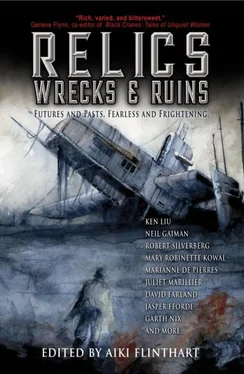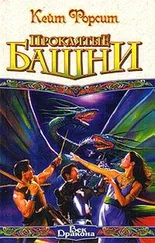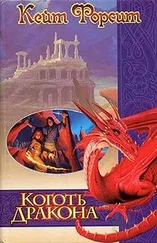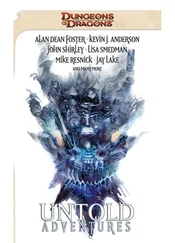When that happened, Kennedy would bury her face in her children’s hair and drink in the scent of apple shampoo and the Wisconsin outdoors. She would sob ugly tears into Cole’s chest, and let him rock her like a baby. Until then, she would be the unflappable captain of this ship.
Until then, they would stay calm and sit tight.
#
When the bodies of the dead had been stowed, the Tartarus ’s medic and its chief engineer joined Kennedy in the control room.
Pale and drawn, the medic cleared his throat before giving his report. Kennedy’s throat was raw, too. By now the fire-retardant foam had dried; it was still like breathing acid.
“There are four dead, including Cohen and McNaught,” the medic said. There was a smear of blood on the cuff of his uniform.
Kennedy nodded. She’d already had the numbers from Masterton.
“On top of that, we have five wounded, not counting those with minor bruises and bumps—which is practically everyone.”
Kennedy couldn’t help lifting her hand to her neck, still aching from the whiplash. All around her, the control room hummed with the bleep of systems checks and the murmur of status reports.
“And the five wounded?” she asked. “How are they faring?”
“Two have concussion—I’ll keep an eye on them in case they deteriorate. One dislocated shoulder—I’ve already reset it—and one of the cooks has extensive scalding. All survivable. It’s Ensign Rafferty who worries me most. His pelvis is shattered; it’s likely he has some internal injuries. Without hospital care, he might not make it to Sunday’s ice cream social.”
Kennedy grimaced. “The navy is working on getting us to the surface as soon as possible, but it’s going to take time.”
“How long?” Scotty said, the engineer as brusque as his Trekkie namesake.
“I spoke with the commodore an hour ago. They’re working on a plan now.”
She pursed her lips remembering the terse conversation with her commander. To be fair, the navy was never going to be happy about the situation. The Tartarus was the outcome of billions of dollars of research effort, its recharging technology a closely guarded military secret.
“So, the vessel is lost,” the commodore had said.
“I believe so, sir. There’s an outside chance the propellers could clear the rocks without jamming, but in the event we don’t succeed, it would leave the Tartarus without power.”
Under normal conditions, the Tartarus recharged its liquid-flow battery by tethering to the seabed and allowing the ocean currents to spin the internal turbines like water over gills. The Tartarus ’s inflow vents were intact, but with the water outflow buried, there were no currents to speak of. No recharging meant no power and no oxygen. Eventually, the Tartarus was going to flicker out, and its crew with it.
“We could certainly attempt to break out,” she added, when the commodore didn’t speak. “And as the ship’s captain, I’d be willing to volunteer myself for the task—but only after my crew are safely away.”
The commodore remained silent. A glitch in the line, or just a minute of reflection? To Kennedy, the moment felt heavy with accusation, as if she ought to have predicted the eruption and steered the Tartarus out of danger.
“Let me speak to Cohen,” he said eventually.
“Cohen is among the dead, sir.”
“Ah.” Another pause. “Shame.”
Kennedy’s eyes narrowed. Why ask to speak to Cohen? The Tartarus was her command. “Sir? Is there something I should know?”
“No, no. Cohen and I go way back, is all. Don’t worry, Captain. We’re going to get you and your crew out of there. But it’s going to take us a while to get things underway, so you’ll need to be patient.”
“At present, we’re at 89 percent charge. The Tartarus has oxygen tanks for two days, and we can also create oxygen through electrolysis. But splitting water will mean drawing heavily on the available charge,” Kennedy said. She was wasting air; the commodore knew all this.
“I’m fully aware of the ramifications, Captain,” the commodore had said tersely. “I’ll update you as soon as I have some information.” He had cut the connection.
The medic cleared his throat again, bringing Kennedy back to the crew briefing. “In the meantime,” he said, “we’re going to need to reduce our energy consumption.”
“We can cut some lights, turn down the heating. Keep everyone in their bunks. That’ll allow us to eke out charge,” Scotty said.
Kennedy nodded. “I’ll announce the measures on the 1MC and come back and chat to the wounded a little later.”
When the men had returned to their respective stations, leaving only the control room crew, Ensign Hurst turned to her. “Are we going to be shark shit, Captain?” she asked.
The other crew members looked to Kennedy. It was a fair question.
Another deluge of rock hammered the Tartarus , boulder-sized hail, louder than artillery fire, rattling her bones. Grunts and cries echoed through the ship. Everyone snatched for a handhold. Kennedy planted her feet. Held her breath. There was nothing to do but hold on and hope.
When at last the rocks clattered to a stop, the crew looked again to Kennedy.
“No, Hurst, we are not,” she replied. “Not if I can help it.”
#
A day passed. And another. In the watery limbo, an endless night hovering between life and death, Kennedy didn’t sleep. Even the wounded slumbered fitfully. If these were to be their last hours, no one wanted to waste them sleeping. Instead, they read, told stories, passed photos, sketched. One man played a blues harp.
In the control room, Kennedy wrote letters to Cohen’s wife and sister, to McNaught’s mother, and the families of the other deceased. She thought of her own babies, Carlotta and Marie, of the letter she might want to receive, and took her time perfecting her prose, using words like service, and honor, and courage.
That done, she had Hurst contact HQ again. “I’d appreciate an update,” she told her commander.
“We’re still working on it,” the commodore said.
Kennedy wanted to scream, but he was their lifeline, the man in charge of getting them off this ridge so, for the sake of her crew, she kept her voice even. “Ensign Rafferty’s condition has deteriorated.”
“Look, Captain, the US Navy is doing everything it can. We think we’ve located you, but there are issues on the surface—a storm is hampering our rescue efforts. You need to trust me, as soon as we get a break in the weather, we’ll get your people out of there.” His voice was overly cheery. Putting a positive spin on things to keep up morale.
Pulling her jacket around her shoulders, Kennedy checked the battery power: 38 percent. They were running out of time.
She wrote to Carlotta and Marie. Handwritten notes. So young, Marie, would likely forget her if she didn’t come home, her face blurring in her daughter’s memory, but Carlotta was older and would remember. Kennedy labored over the paragraphs, yet the words were insufficient and lackluster. Nothing could capture her feelings for them, the ache their loss would cause her.
In the end, she quoted Apollinaire:
“Vienne la nuit sonne l’heure / Les jours s’en vont je demeure.”
“Let night come, toll the hour. The days pass by, I remain.”
If they ever saw the letters, Cole would explain. Perhaps he would take them to Paris, so they could watch the gray water of the Seine pass beneath the bridge.
Of course, they might never get her letters. The US Navy was good at keeping secrets. The SSBN James Madison had clipped a Soviet sub in 1974 during the Cold War, and nothing was known of it for forty-three years. In forty-three years, her girls would be in their fifties—older than she was now.
Читать дальше











